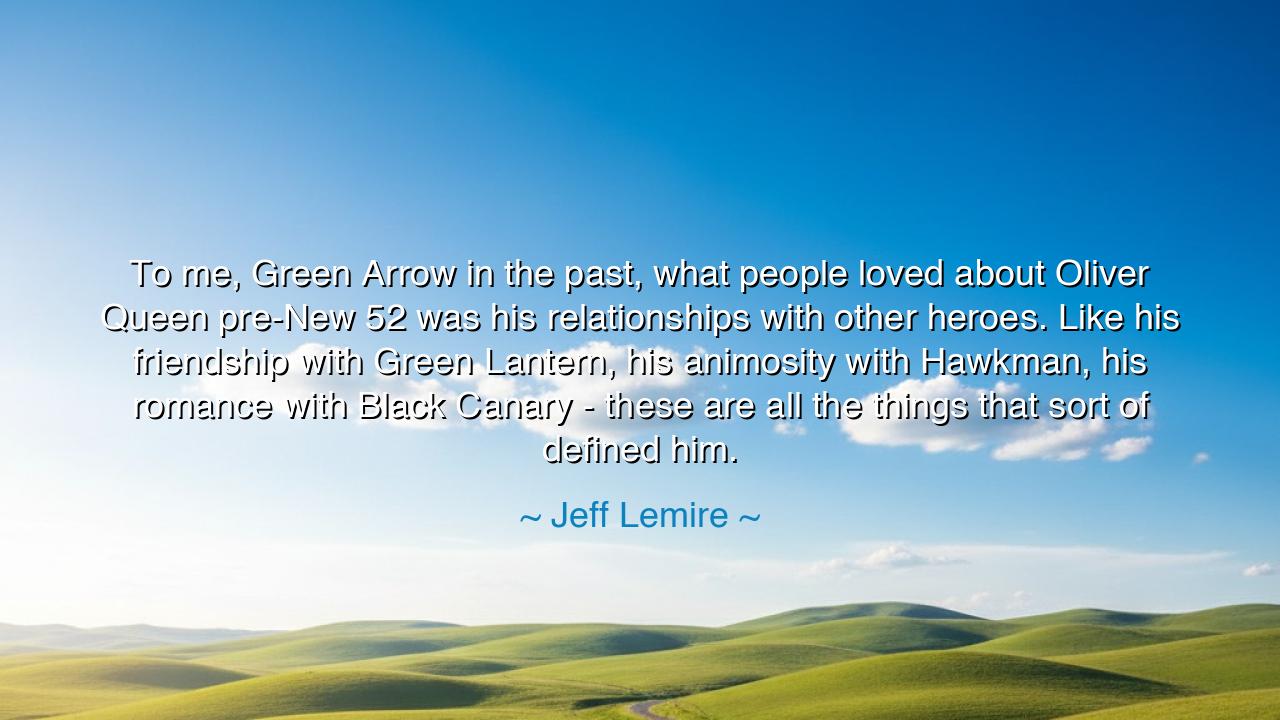
To me, Green Arrow in the past, what people loved about Oliver
To me, Green Arrow in the past, what people loved about Oliver Queen pre-New 52 was his relationships with other heroes. Like his friendship with Green Lantern, his animosity with Hawkman, his romance with Black Canary - these are all the things that sort of defined him.






In his reflection, Jeff Lemire — writer, storyteller, and modern mythmaker — speaks not only of a comic book hero, but of the essence of identity itself. He says: “To me, Green Arrow in the past, what people loved about Oliver Queen pre-New 52 was his relationships with other heroes. Like his friendship with Green Lantern, his animosity with Hawkman, his romance with Black Canary — these are all the things that sort of defined him.” Beneath the surface of comic lore lies an ancient truth: that a person’s greatness is not born in isolation, but in the web of their relationships — in love, in rivalry, in fellowship, and in struggle. Lemire reminds us that even the mightiest hero is made human by the bonds that shape him.
The origin of this quote emerges from Lemire’s tenure as writer of Green Arrow for DC Comics, following the sweeping New 52 reboot — a restructuring of DC’s mythologies meant to modernize its heroes. Yet in doing so, many of their relationships and histories were erased or rewritten, leaving once richly intertwined characters suddenly untethered. Lemire, as both a craftsman of stories and a student of humanity, observed that what made Oliver Queen, the Green Arrow, beloved was not only his crusade for justice, but the way he lived among others: how he quarreled with Hawkman’s rigidity, how he bonded with Green Lantern’s sense of honor, how he loved Black Canary’s fierce spirit. These connections were his moral compass, his fire, his flaw, and his redemption.
In speaking thus, Lemire touches a chord as ancient as the myths of Greece and the legends of kings. For even Achilles, the greatest of warriors, was defined not by his strength alone but by his friendship with Patroclus, whose loss revealed the humanity beneath the armor. Likewise, King Arthur was not remembered merely for Excalibur, but for his brotherhood with Lancelot and the circle of knights who mirrored his own light and shadow. So too with Green Arrow: his character is not built upon the bow he wields, but upon the souls he encounters, loves, challenges, and forgives. In this, Lemire teaches that relationship is the forge of identity, and that the heart of any hero — real or imagined — beats strongest when it beats alongside others.
There is something deeply human in the way Oliver Queen is portrayed through his friendships and rivalries. His bond with Green Lantern reflects the balance between idealism and rebellion — one the cosmic lawkeeper, the other the grounded crusader for the common man. Their companionship is a dialogue between heaven and earth, a friendship that teaches each to temper their extremes. His animosity with Hawkman symbolizes the eternal conflict between order and freedom, between the warrior bound by tradition and the rebel guided by conscience. And his romance with Black Canary — fierce, volatile, and passionate — reveals that even those who fight the darkness crave tenderness and understanding. These relationships, like constellations, define the hero’s sky; without them, he would be only a single star lost in the void.
What Lemire recognized — and what all storytellers must remember — is that connection gives meaning to strength. A hero without others is not a hero but a shadow. The same is true for every human soul. We are defined not merely by what we do, but by whom we touch, challenge, and love along the way. Our friendships reveal our generosity, our conflicts reveal our principles, our loves reveal our courage, and our losses reveal our resilience. In this way, Lemire’s insight into Green Arrow’s relationships becomes a mirror to life itself: we are shaped by the hearts that surround us.
History gives us many such reminders. Consider Nelson Mandela, whose greatness was not forged in solitary triumph but in the network of allies, rivals, and comrades who walked beside him. It was his dialogue with others — from his adversaries in prison to his partners in struggle — that defined his moral clarity. Like Oliver Queen, Mandela’s strength was not his weapon, but his capacity for connection. It is through such parallels that we understand Lemire’s point: that no story — not even the story of a hero — can exist in isolation.
The lesson, therefore, is both humble and powerful: cultivate your relationships, for they are the architecture of your destiny. In practical action, this means cherishing the friends who challenge you as much as those who comfort you; learning from rivals instead of resenting them; and honoring the loves that teach you both joy and pain. Just as Green Arrow’s story is written through the people who surround him, so too is yours. To live fully is to engage deeply — to stand among others, not above them. For in the end, as Jeff Lemire’s words remind us, our greatest battles are fought not alone, but together — and it is through friendship, conflict, and love that the true hero within us is born.






AAdministratorAdministrator
Welcome, honored guests. Please leave a comment, we will respond soon